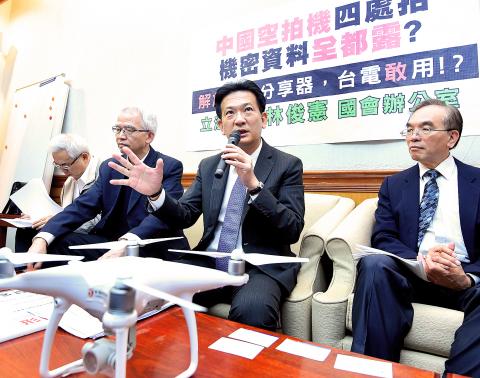Allegations of misappropriation of public funds by a Taiwan Power Co (Taipower, 台電) Research Institute member, surnamed Hsieh (謝), that surfaced on Wednesday snowballed into the possibility of threats to national security yesterday when it emerged the institute had purchased drones linked to a Chinese satellite system.
Affairs regarding national or information security must exclude Chinese businesses and Chinese-manufactured equipment, Democratic Progressive Party (DPP) Legislator Lin Chun-hsien (林俊憲) said.
Taipower’s responsibilities — overseeing the nation’s power grid and allotting power to businesses — mandates that it complies with that regulation, much less purchase drones with built-in links to the Chinese Beidou Satellite Navigation System, which is an information security hazard, Lin added.

Photo: Chu Pei-hsiung, Taipei Times
The system is said to be designed for navigation, but the system reportedly offers two services, one being a navigation system for private use and the other a restricted service to handle China’s and Pakistan’s military communications and location data.
Taipower Research Institute director Koai Kwan-lu (蒯光陸) said the drone purchase was made to solve a problem regarding insulator cleaning, which caused a helicopter to crash in November 2015.
One large machine and two smaller training machines have been ordered in accordance with the Government Procurement Act (政府採購法), Koai said, adding that the large machine would be manufactured by Taiwanese company Avix Technology Inc (田屋科技有限公司).
It will come with equipment that receives data from the US’ GPS network, as well as Russia’s GLONASS and China’s Beidou, Koai said, adding that the company would remove the equipment that enables the machine to receive data from the Beidou system to allay fears of information security leaks.
The equipment Lin referred to is priced at about NT$50,000 and would only be used for training purposes, Koai said.
Avix promised to deliver the larger machine next month, but Taipower would withhold payment until all security concerns have been laid to rest, Koai said.
Homeland Security Office Director Huang Chun-tai (黃俊泰) said government regulations clearly forbid the purchase of all Chinese-manufactured equipment.
Lin on Wednesday said that Hsieh purchased high-end electronics products, including several Apple Inc Macbook computers and iPads, and Sony Corp a7 cameras — unrelated to his research into “smart” electricity meters.
Yesterday, Lin said Hsieh also purchased a Mavic Pro aerial photography drone manufactured by China’s Dajiang Innovation Technology Co (大疆), as well as a router and a wireless network card manufactured by Chinese electronics maker Huawei Technologies Co (華為).
Additional reporting by Lin Chu-han

MAKING WAVES: China’s maritime militia could become a nontraditional threat in war, clogging up shipping lanes to prevent US or Japanese intervention, a report said About 1,900 Chinese ships flying flags of convenience and fishing vessels that participated in China’s military exercises around Taiwan last month and in January have been listed for monitoring, Coast Guard Administration (CGA) Deputy Director-General Hsieh Ching-chin (謝慶欽) said yesterday. Following amendments to the Commercial Port Act (商港法) and the Law of Ships (船舶法) last month, the CGA can designate possible berthing areas or deny ports of call for vessels suspected of loitering around areas where undersea cables can be accessed, Oceans Affairs Council Minister Kuan Bi-ling (管碧玲) said. The list of suspected ships, originally 300, had risen to about 1,900 as

Japan’s strategic alliance with the US would collapse if Tokyo were to turn away from a conflict in Taiwan, Japanese Prime Minister Sanae Takaichi said yesterday, but distanced herself from previous comments that suggested a possible military response in such an event. Takaichi expressed her latest views on a nationally broadcast TV program late on Monday, where an opposition party leader criticized her for igniting tensions with China with the earlier remarks. Ties between Japan and China have sunk to the worst level in years after Takaichi said in November that a hypothetical Chinese attack on Taiwan could bring about a Japanese

Right-wing political scientist Laura Fernandez on Sunday won Costa Rica’s presidential election by a landslide, after promising to crack down on rising violence linked to the cocaine trade. Fernandez’s nearest rival, economist Alvaro Ramos, conceded defeat as results showed the ruling party far exceeding the threshold of 40 percent needed to avoid a runoff. With 94 percent of polling stations counted, the political heir of outgoing Costa Rican President Rodrigo Chaves had captured 48.3 percent of the vote compared with Ramos’ 33.4 percent, the Supreme Electoral Tribunal said. As soon as the first results were announced, members of Fernandez’s Sovereign People’s Party

MORE RESPONSIBILITY: Draftees would be expected to fight alongside professional soldiers, likely requiring the transformation of some training brigades into combat units The armed forces are to start incorporating new conscripts into combined arms brigades this year to enhance combat readiness, the Executive Yuan’s latest policy report said. The new policy would affect Taiwanese men entering the military for their compulsory service, which was extended to one year under reforms by then-president Tsai Ing-wen (蔡英文) in 2022. The conscripts would be trained to operate machine guns, uncrewed aerial vehicles, anti-tank guided missile launchers and Stinger air defense systems, the report said, adding that the basic training would be lengthened to eight weeks. After basic training, conscripts would be sorted into infantry battalions that would take